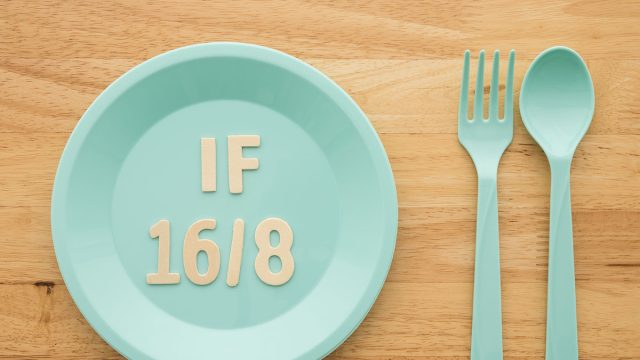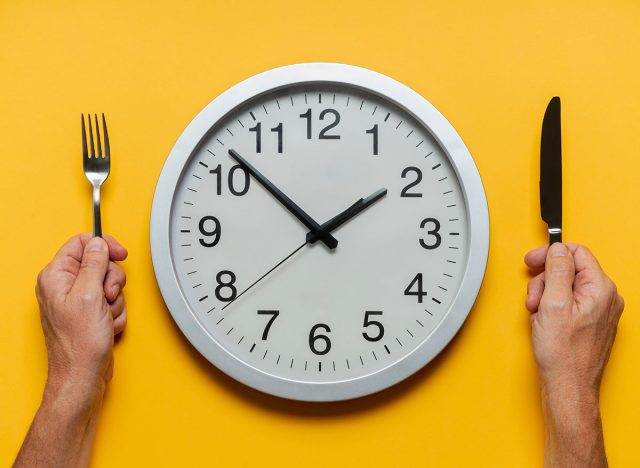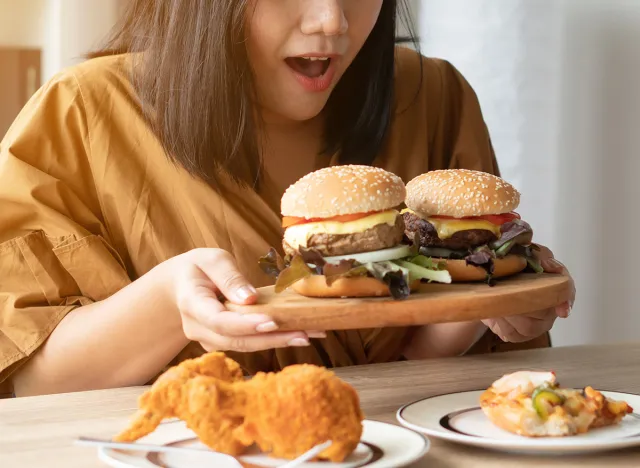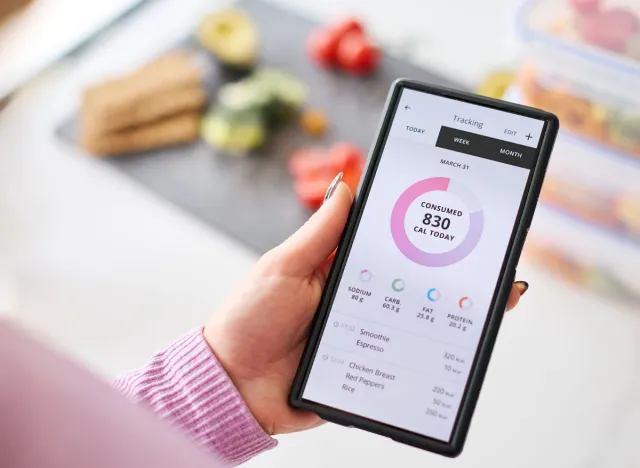3 Truths I Tell My Patients About 16:8 Fasting as a Medical Professional

Are you considering trying intermittent fasting to lose weight? Doctor James O'Donovan, MBBS, specializes in aging and regularly shares videos on promoting longevity. In one of his viral videos, he discusses a popular weight loss method, 16:8 intermittent fasting, going over everything you need to know about the trending eating style.
What Is Intermittent Fasting?
"Intermittent fasting is when you alternate between periods of eating and fasting. This type of eating is often described as 'patterns' or 'cycles' of fasting," he writes in the caption of the clip. "Intermittent fasting isn't about starving yourself — it's about cutting way back on calories for short time periods. The belief is that your body becomes satisfied with smaller portions while also reducing cravings for unhealthy snack foods. That is, as long as you maintain a healthy diet while trying it all out."
16:8 Fast for 16 Hours and Feast for 8

16:8 Intermittent fasting is "a popular type of intermittent fasting that involves fasting for 16 hours and an 8-hour eating window," he writes. He goes on to explain what it is, "what time windows you might want to choose for your fast, food groups to consider, and benefits and drawbacks of intermittent fasting."
It's Not About What You Eat, But When You Eat

"Many diets focus on what to eat, but intermittent fasting is all about when you eat. With intermittent fasting, you only eat during a specific time. Research shows fasting for a certain number of hours each day or eating just one meal a couple days a week may have health benefits – for example, for losing weight and for better control of diabetes," he says.
More Details About Intermittent Fasting

"Intermittent fasting involves limiting your daily food intake to a certain window of time. Now, one of the most popular types of intermittent fasting is a diet that's called the 16 eight intermittent fasting diet," he continues. "Essentially, this involves limiting your intake of food and drinks, which contain calories, to a set window of eight hours a day. Now, for the remaining 16 hours, you abstain from food and drink. However, you are still allowed to drink water and other non-calorie beverages, such as plain coffee or tea. Importantly, you can repeat this cycle as frequently as you like, from just once or twice a week to every day, and it will all depend on your personal preference as well as what fits in with your lifestyle."
It's Easy to Follow and Is Less Restrictive Than Other Diets

"While other diets often set out strict draws, 16 eight, intermittent fasting is easy to follow, and it might provide measurable results with minimal disruption to your diet," he notes. "It's generally considered less restrictive and more flexible than many other diets, and it works well with most lifestyles."
RELATED: I'm 70 but Look 40 Thanks to These 7 At-Home Exercises
Choose a Time Window That Works for You

It's key to choose a time window that works for you. "You should begin by picking an eight-hour window and limiting your food intake to that time span. Now, this is obviously going to depend on your lifestyle, but some popular eight-hour time windows to eat are from 7:00 AM to 3:00 PM, 9:00 AM to 5:00 PM, 12:00 PM to 8:00 PM, as well as 2:00 PM to 10:00 PM," he says. "Basically, what I'm trying to convey by this is that there is no one fixed way to do things. The best thing to do is that when you're starting out, try to experiment and pick the timeframe that best fits your schedule." He also recommends setting a timer for the start and stop times of your feast period.
Eat Nutritious Whole Foods

"Now we've discussed the time window. Let's just discuss some of the food and meal plans now to maximize the potential health benefits of any diet," he continues. "It's important to stick to nutritious whole foods and beverages during your eating period. Filling up on nutrient-rich foods will basically help you round out your diet and support a healthy weight. Trying to balance each meal with a variety of whole foods can include things like fruits, such as apples, bananas, berries, oranges, pears, or tomatoes, and vegetables, so things like broccoli, brussels sprouts, cauliflower, cucumbers, and leafy greens. Things like spinach and kale, as well as whole grains, are really important."
He also recommends barley, buckwheat, quinoa, rice, and oats, healthy fats like olive oil and avocados, and protein sources, including eggs, fish, meat, poultry, nuts, and seeds.
And Stick to Zero Calorie Drinks

He also tackles the topic of beverages. "In terms of drinking, I would just encourage you to drink water and avoid any calorie beverages," he says. "These are things like pops and sodas. I would just stay very clear of those."
Avoid Ultra Processed Foods

"It's important also to avoid ultra-processed foods, things like packaged snacks, deep fried items, sugary drinks, and most frozen meals," he continues. "These foods are often full of bad sugars and preservatives, which are going to spike your blood sugars quickly, and they're going to make you feel more hungry. And ultra-processed foods have actually been linked with a whole host of negative health outcomes, so things like type two diabetes, high blood pressure, certain cancers, and even dementia."
RELATED: I Lost 90 Pounds in 3 Years Without Giving Up My Favorite Foods
Here Are the Potential Benefits

He goes on to discuss the potential benefits of this diet. "The first potential benefit of restricting your eating window to a few hours a day is that you can cut your calorie intake over the course of the day, which may, in turn, contribute to weight loss. For example, one review of the scientific literature on intermittent fasting found that it's in 11 of the 13 studies on intermittent fasting. It was reported there was statistically significant weight loss in participants," he says. Another benefit? Improving blood sugar.
"Intermittent fasting has been shown to reduce fasting insulin and blood sugar levels, potentially decreasing your risk of diabetes. Now, if you've got type two diabetes, intermittent fasting might be an effective intervention, but you should speak to your own doctor before embarking on this diet to see if it will work for you."
Here Are the Potential Drawbacks

He also discusses potential drawbacks. "The first thing to state is that it's important that if you decide to embark on this type of fasting, that you do it gradually and you consider stopping or consulting your doctor if you've got any concerns or you experience any negative symptoms," he says. "One of the other downsides is the potential for overeating as well as potential weight gain. That's because restricting your intake to just eight hours a day may cause some people to eat more than usual during the eating periods in an attempt to make up for the hours spent fasting. Now, this may lead to weight gain, digestive problems, and unhealthy eating habits."
He adds that some people experience short-term physical symptoms. "These include things like hunger, weakness, and fatigue, although these often subside once you get into a routine," he says.
Fasting Doesn't Necessarily Lead to Weight Loss

"Now, interestingly, current research doesn't suggest that intermittent fasting leads to any more weight loss than typical diets that recommend overall calorie restriction. Both eating patterns may lead to moderate weight loss. Now, suppose weight loss is your primary goal. In that case, you might prefer to lower your calorie intake instead of fasting intermittently to prevent the overeating that can occur when restricting intake to certain time windows," he says.
RELATED: I Wore a 25-Pound Vest for a Year and These 7 Things Happened
Here Are His Top Tips

He goes on to reveal his top intermittent fasting tips. "If you do want to start this, you should start with just one to two days a week and see if it works for you," he says. "You should try different timings to see which fits your lifestyle. If you've got a long-term health condition, you should first consult your doctors to discuss whether or not this is the right type of dieting for you. This is important if you're taking any medications if you've got diabetes, low blood pressure, or a history of disordered eating. It's also important not to view 16-8 intermittent fasting as a substitute for eating a balanced diet rich in whole foods. And similarly, intermittent fasting is discouraged if you're trying to conceive your pregnant or your breastfeeding." And if you enjoyed this article, take advantage of these 15 Quick Ways to Lose Body Fat Percentage in a Week.




